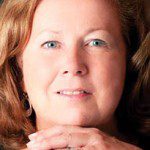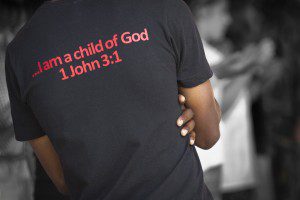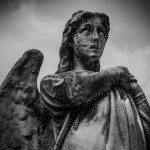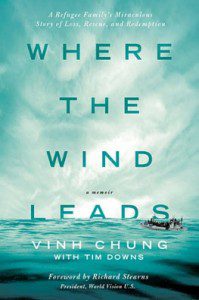 Where the Wind Leads is the incredible story of Vinh Chung and his family of ten as they fled communist Vietnam for a better life in America. Their story takes them out into the dangerous South Indian Ocean on a small fishing boat, exposed to barbaric Thai pirates, thirst and hunger, and unreceptive governments of foreign shores, before being rescued by a World Vision mercy ship. The story is riveting, heart-breaking, and ultimately inspiring in its tale of hope, perseverance and rescue.
Where the Wind Leads is the incredible story of Vinh Chung and his family of ten as they fled communist Vietnam for a better life in America. Their story takes them out into the dangerous South Indian Ocean on a small fishing boat, exposed to barbaric Thai pirates, thirst and hunger, and unreceptive governments of foreign shores, before being rescued by a World Vision mercy ship. The story is riveting, heart-breaking, and ultimately inspiring in its tale of hope, perseverance and rescue.
The Patheos Book Club spoke to Dr. Chung about his story this week. (For more on this book, including an excerpt, visit the Patheos Book Club.)
The story of your family’s journey as refugee “boat people,” escaping Vietnam for a better life is extraordinary. Why did you choose to share your story at this time?
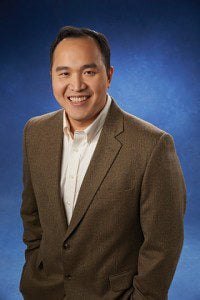 I had not planned on writing a book.
I had not planned on writing a book.
It may sound surprising that I never thought my story is special or that it should be shared in a book. I have always been familiar with bits and pieces of the story since childhood, so it’s just a part of my history.
Several years ago, I was invited to share my family’s story with the staff at World Vision. I am deeply grateful to this organization, so my goal was just to thank the World Vision staff for everything they do. I wanted them to know what has happened to this family World Vision rescued 35 years ago, and I wanted them to know that their work has a lasting impact.
I was overwhelmed by the powerful emotions my story evoked. As I shared it in subsequent talks, more people told me how much the story meant to them and encouraged me to share it. This culminated in a 3 week time period when multiple Christian leaders, authors, book agents, and a publisher talked to me about writing a book. So two years later, here’s the book.
Perhaps even more remarkable is how un-extraordinary your circumstance was at that time in history. Families were leaving Vietnam by the thousands, with a very low rate of survival. The stories you recount about most people’s journeys are chilling. Why did your family feel it would be better to set off on an unknown and dangerous journey at sea than remain, safe, in Vietnam?
The decision to leave was not an easy one. My mother believed that living meant more than simply trying to stay alive. She wanted to leave, because she wanted a future for her children. My father, however, had mixed feelings. He knew that leaving the country meant endangering the entire family.
The decision, however, was essentially made for us. My family is ethnic Chinese, and in the late 1970s, the Vietnamese government’s attitude toward the Chinese became increasingly hostile. When we began to sense that public sentiment was turning, my family felt it was prudent to leave.
My parents understood the risk of potential death at sea. Even if we were to survive, there were so many uncertainties with where we would end up. However, staying back in Vietnam would be to accept the certainty that their children would have no future. So, my parents made the painful decision to leave behind all they knew; they believed it better to place themselves and their children’s fate to chance.
You were only three years old when you and your seven siblings and parents sailed away from Vietnam on a small fishing boat. What do you remember, as a child, about the journey your family embarked on? Did you ever have a sense that you might not make it?
I was fortunate to be only three and a half years old when my family of ten left Vietnam. Many of my memories were only sensory. I remember being dropped into the ocean when we disembarked our boat to get to the Malaysian beach. I remember the taste of rice and sardines that we ate directly out of the cans. I also remember the confusion and excitement the happened when World Vision rescued us. I personally did not remember a sense of impending doom. However, my older siblings and my parents remember many of the painful and frightening details as if it were just yesterday.
Adrift at sea, surrounded by his entire family dying of thirst, your father experienced a religious conversion. Tell us about that experience, and the impact it had on him at that moment.
My father had always believed in a higher power and that it was a virtue to be kind and generous. His idea of a higher power was a mixture of superstition, Buddhism, and Confucianism.
When we were adrift at sea, my father looked around and he saw his family dying. He said in that moment, he felt “a moment of clarity.” At the brink of death, my father said he felt as if something spoke to his soul, and he knew he had to call out to his Creator. He was not a man who prayed, but he knelt down and cried out to his Creator. It was a desperate and raw cry that was in many ways the purest prayer one can have. At that point, he made a connection with God, and God answered by bringing down rain.
Onboard Seasweep (the World Vision ship that rescued us), my father was invited to attend a worship service; he felt it would be an insult if he declined and he also wanted to understand why a group of strangers would go to such trouble and expense to save my family. At this service, Stan Mooneyham, the president of World Vision, shared about the love, forgiveness, and salvation through Jesus Christ. My father was riveted by these words, and he tells me that everything about his life and the journey on the boat made sense in that moment.
For over 35 years since then, God has been as real to my father as much as life itself.
After several false hopes for a rescue, you were at last discovered and rescued by a World Vision mercy ship. Tell us what you remember about that day? And what is your relationship with World Vision today?
I remember the excitement and the adults yelling at the kids “Lie down! Lie down!” trying to make us all appear sick and desperate, so that the World Vision crew would show us mercy. It’s funny now to think that we had to make an effort to appear that way, considering most of us were sick and dying from dehydration. I remember lying down and trying to look dead, but I had to sneak a peek at the boat so that I wouldn’t miss anything.
Today my wife and I are partnering with World Vision. They have a 63-year-legacy of fighting poverty, tackling injustice, and helping the poorest of the poor. We sponsor a project in Cambodia, combatting child sex trafficking. We also sponsor clean water projects in Rwanda. We run with Team World Vision, running races to raise money for clean water in Africa. This past January, I became a member of the Board of Directors for World Vision US. This is an incredible honor and privilege to reconnect with an organization that saved my life and continues to save lives around the world.
Once your family arrived in America, you were finally “safe,” but life was not easy by any means. Once a prosperous family in Vietnam, your family arrived here with nothing, no knowledge of the English language, no jobs, friends or extended family. How did you all persevere during those hard days? What kept you going?
The answer to this question depends on whether you ask my parents or whether you ask me.
For my father, he knew he had to take care of his family. My father may have been COO of a multi-million dollar company, but in the U.S., he worked on an assembly line in unbearable heat, taking every overtime hour possible. He believed, however, that if he sacrificed, his children would have a better future. That hope for a brighter future and his faith in God helped him to endure decades of back-breaking labor.
For me, I would describe my childhood as happy. I have funny stories about sharing one bike with my three brothers and coming up with games to kill all the cockroaches in our apartment. Despite my circumstances, I had a close family with ten siblings and two parents who loved us. Yes, we worked long hours in the family restaurant, and yes, there were times when I realized I had less than others. But we considered ourselves fortunate; we didn’t have much, but we always faced challenges together. That gave each of us resilience in this new, confusing world.
At the end of your book, you ask the question I was also asking all along: Why was your boat “blessed” to find rescue and safety and deliverance to America, while the other two boats with your extended family did not? As a person of faith, how do you answer that?
I honestly do not have an answer to “Why” God chose to rescue my family and not others. We did not do anything to be more worthy than any of the other hundreds of thousands of Vietnamese boat people. We were rejected from our country, lost in the middle of nowhere, and God rescued our family. I believe that many characters in the Bible would have the same difficulty with answering the question “Why.” But I’ve long come to realize that I do not need to know the answer to all my questions.
My life seems like a series of improbable events. When I step back and reflect on all these events, I can clearly see the hand of God in my life.
When I returned to Vietnam, I saw what my life could have been if things had turned out differently. There is a scene in the book when I meet my cousin. She was on the same large boat that left Vietnam, but when we were divided into separate smaller boats in Malaysia, she was in a different boat. My boat was rescued by World Vision, and her boat drifted back to Vietnam.
My cousin was living in a little shack in the rural Mekong Delta with no electricity or running water. I was a student at Harvard Medical School. As we greeted each other, she began to cry quietly. I looked at her life, and I was seeing my parallel universe; it was the life I would have led if the wind had blown in a different direction. For her, she was also viewing her parallel universe. I had the life she could have led, if the wind had blown in a different direction.
In that moment, as I stood next to my cousin, I was not swollen with pride at all of my accomplishments. I was not proud of my Harvard degree or my future career as a doctor. Instead, I felt something much deeper… I felt shame. I felt shame because I realized that I had been entrusted with so much, and I had an obligation to do more with what God had given me.
The memory of that moment continues to fuel me. It is one of the reasons I work with World Vision. I have been entrusted with much; my life did not end anonymously in the South China Sea, as it should have. Instead, I have an opportunity and an obligation to send back a boat for others.
Your story has such a happy ending, complete with a beautiful love story about you and your wife. It’s rather stunning to me that all of your family ended up so well after such a traumatic beginning. Could you ever have imagined such an ending for your life?
I could have never dreamed of the life I have today. All my father wanted was for me to be able to hold a job where I can sit in an air conditioned office. I had planned to attend our state university, get a medical degree, and return to my hometown living out a comfortable life.
Just as the World Vision ship changed the course of my life, my wife has also changed my trajectory. She encouraged me to reach as high as possible. She double-dared me to apply to top schools, and when you’re a 17-year-old boy, you can’t turn down a dare from a girl. I began to dream bigger.
Today, we continue to dream together. Our greatest dream is to change the world, and through World Vision, we are able to do just that. I have four beautiful kids, and I’m still madly in love with my wife!
What do you hope people most take away from your book?
I want people to see that every single child has a name, a story, and enormous potential.
Today, there are children around the world who are in desperate situations, just as I was: children who are in Syrian refugee camps, children who walk hours to fetch water that is not drinkable, children who are sold into brothels. There are also children in our very own communities who are struggling.
I want people to realize that these children are no different from you and me. They are no different from our own children. They each have a name and a story to be told.
Without Stan Mooneyham, my story would have ended anonymously at the age of three in the South China Sea. Instead, I am here sharing my story in this book. Similarly, our actions today can help rewrite the rest of the stories of these children. As you can see in my family, the actions we take can impact generations and perhaps an eternity.
For more on this book, including an excerpt, visit the Patheos Book Club.



